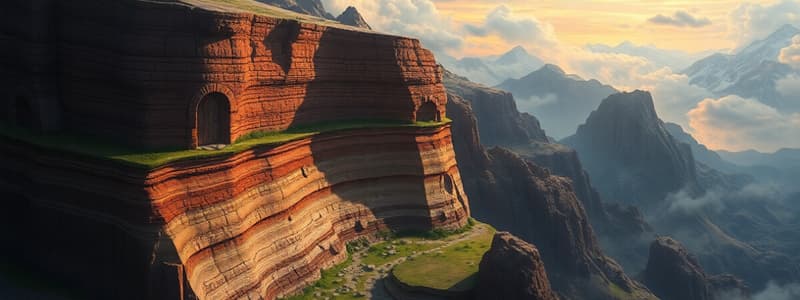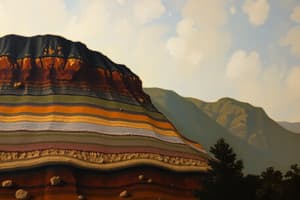Podcast
Questions and Answers
Which layer of the Earth is primarily responsible for the Earth's magnetic field?
Which layer of the Earth is primarily responsible for the Earth's magnetic field?
- Mantle
- Crust
- Outer Core (correct)
- Inner Core
The Mohorovičić Discontinuity (Moho) marks the boundary between the mantle and the outer core.
The Mohorovičić Discontinuity (Moho) marks the boundary between the mantle and the outer core.
False (B)
What is the primary difference in composition between the continental and oceanic crust?
What is the primary difference in composition between the continental and oceanic crust?
Continental crust is composed of silica and aluminum-rich rocks (sial), while oceanic crust is composed of silica and magnesium-rich rocks (sima).
The semi-molten layer of the upper mantle, which allows for tectonic plate movement, is known as the _________.
The semi-molten layer of the upper mantle, which allows for tectonic plate movement, is known as the _________.
Match the following Earth layers with their primary composition:
Match the following Earth layers with their primary composition:
Which discontinuity marks the transition from liquid to solid iron-nickel composition within the Earth?
Which discontinuity marks the transition from liquid to solid iron-nickel composition within the Earth?
The inner core is liquid due to the high temperatures.
The inner core is liquid due to the high temperatures.
Explain why seismic waves travel faster below the Mohorovičić Discontinuity (Moho).
Explain why seismic waves travel faster below the Mohorovičić Discontinuity (Moho).
Which layer is composed of Sial?
Which layer is composed of Sial?
Flashcards
Earth's Crust
Earth's Crust
The outermost solid layer of Earth; it can be oceanic or continental.
Earth's Mantle
Earth's Mantle
Layer below the crust, composed of silicate minerals rich in magnesium and iron.
Earth's Outer Core
Earth's Outer Core
Liquid layer beneath the mantle, made of iron and nickel; responsible for Earth's magnetic field.
Earth's Inner Core
Earth's Inner Core
Signup and view all the flashcards
Mohorovičić Discontinuity (Moho)
Mohorovičić Discontinuity (Moho)
Signup and view all the flashcards
Gutenberg Discontinuity
Gutenberg Discontinuity
Signup and view all the flashcards
Lehmann Discontinuity
Lehmann Discontinuity
Signup and view all the flashcards
Repetti Discontinuity
Repetti Discontinuity
Signup and view all the flashcards
Asthenosphere
Asthenosphere
Signup and view all the flashcards
Study Notes
- The Earth consists of multiple layers, each defined by unique physical and chemical attributes.
- Discontinuities separate the Earth's layers, indicated by abrupt shifts in material makeup, density, or seismic wave velocity.
Layers of the Earth
- The Earth's layers consist of the crust, the mantle, the outer core and the inner core.
- The outermost layer is the crust, ranging from 0 to 70 km in depth.
- Continental crust mainly contains silica and aluminum-rich rocks (sial).
- Oceanic crust comprises silica and magnesium-rich rocks (sima).
- The mantle extends to around 2900 km below the crust.
- Primarily composed of silicate minerals high in magnesium and iron.
- The upper mantle (Asthenosphere) is partially molten, enabling tectonic plate movement.
- The outer core is located between 2900 and 5100 km.
- It mainly contains liquid iron and nickel.
- Earth's magnetic field is generated in the outer core.
- The inner core spans from 5100 to 6371 km.
- It is solid due to immense pressure.
- The inner core consists mostly of iron and nickel.
Major Discontinuities
- Discontinuities separate the distinct layers within the Earth's structure.
- The Mohorovičić Discontinuity (Moho) is the boundary between the crust and the mantle.
- Seismic waves accelerate below the Moho.
- The Gutenberg Discontinuity lies between the mantle and the outer core.
- It signifies a change from solid silicate rocks to liquid iron and nickel.
- The Lehmann Discontinuity is the border between the outer and inner core.
- It marks the shift from liquid to solid iron-nickel composition.
- The Repetti Discontinuity lies within the mantle and separates the upper and lower mantle.
Studying That Suits You
Use AI to generate personalized quizzes and flashcards to suit your learning preferences.
Description
Explore the composition of the Earth's interior layers, including the crust, mantle, and core. Discover the characteristics of each layer. Learn about the materials that make up the Earth's structure and the role of each layer.




